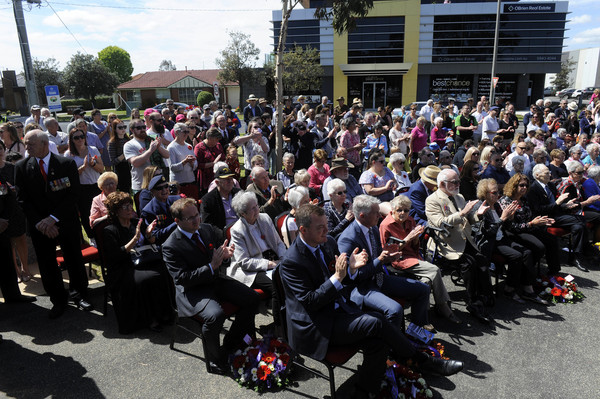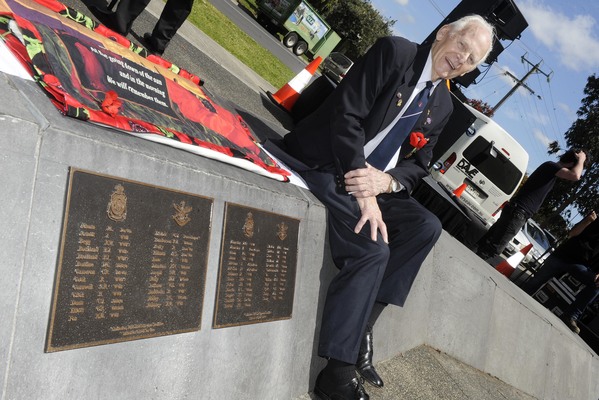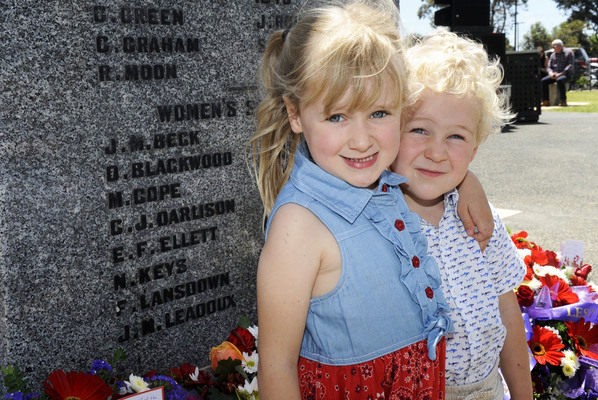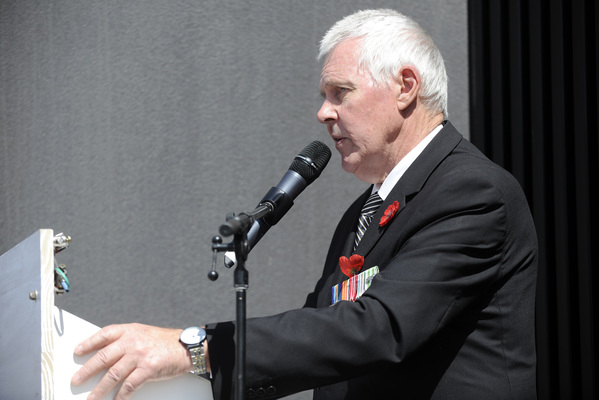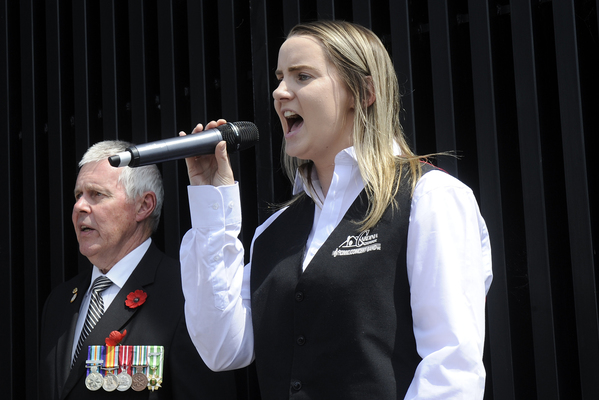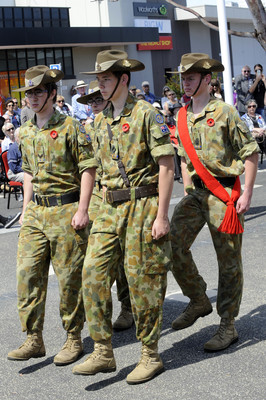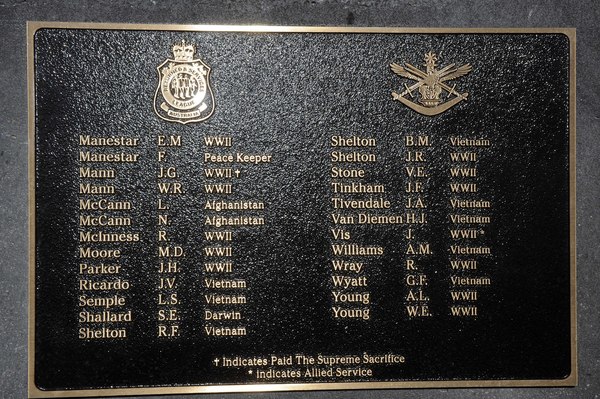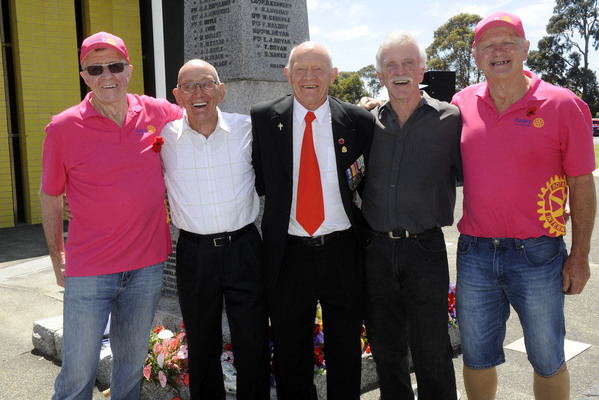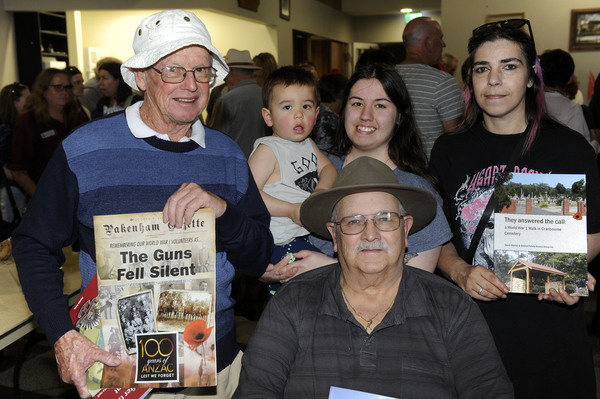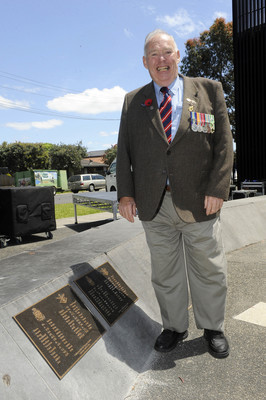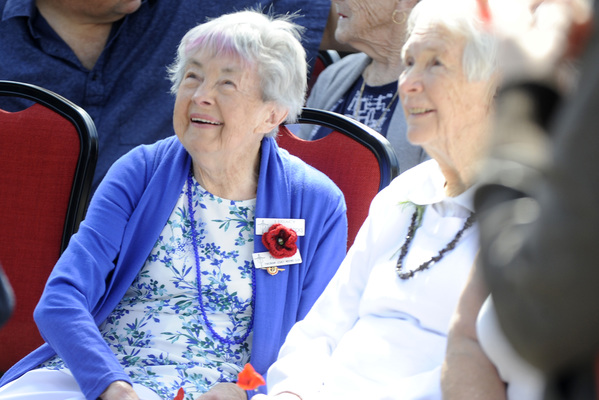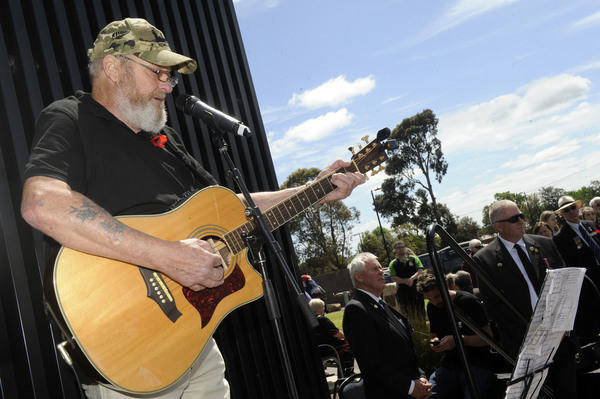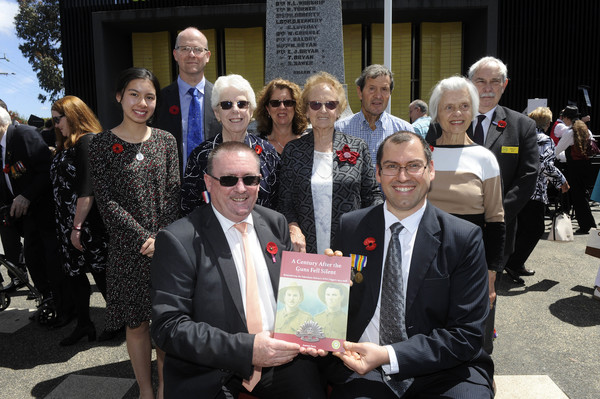
It was all about names and faces at Pakenham Remembrance Day ceremony on Sunday.
To mark the Centenary of Armistice, a book was launched written by local historian Patrick Ferry outlining the stories of all those remembered on Pakenham district war memorials and honour boards.
Each of those 145 names was read out by descendants.
And later in the ceremony a new plaque was unveiled recognising the service of 50 service personnel from various confilcts not previously recognised on the memorial. Again, their names were read out by relatives of some of that group.
Patrick Ferry filled the keynote speaking role and afterwards his book was launched by Gazette editor Garry Howe.
Mr Ferry spoke of the joy felt in the then small community of Pakenham at news of the armistice 100 years ago to the day – but also the sadness at the realization that of the 145 who served, 25 per cent would not return.
He said that for the past two years he had been researching who the Pakenham Diggers were.
“The idea for the project came from the realisation that with the passage of time, the Diggers are inevitably passing from living memory into history. And as an historian, I am conscious that even though their names are carved into stone, they will potentially become obscured by a little bit of dust, even forgotten altogether.”
Mr Ferry said the key focus of the project was to try to locate photographs of the Diggers – literally, to put a face to the names on memorials.
“So who were the 145 WWI Diggers we are stopping to remember today?
“Firstly, I should say that while 145 people does not sound like many to us today, we should remember that there were only around 800 people living in the Pakenham district at the time – and half that number were women. So we are talking about a fairly significant proportion of Pakenham’s eligible male population.
“Some of those who enlisted were members of Pakenham’s oldest pioneering families, such as the Bourkes and Henrys, but others were more itinerant residents who never really put down local roots – farm labourers and the sons of railway workers and police officers. There were farmers, orchardists; business owners and their employees; professionals and unskilled workers; the sons of wealthy graziers and those of more modest means, such as a rabbit trapper; teachers and students; Catholics and Protestants; Australian born and migrants; teenagers who put their age up to go on what they expected would be the adventure of a lifetime; and older men who put their ages down to go, leaving behind families to worry and potentially mourn them.
“Interestingly, there was only one woman amongst them – who served as an Army nurse.”
Mr Ferry said the collective picture which emerged of the Diggers was of normal, everyday people -“ the sorts of people you would have met in Paternoster’s shop on Main Street or Oscar Smith’s blascksmith shop; or in the classroom at Pakenham State School; or at the dances at the Mechanics’ Institute; having a beer at the bar of Bourke’s Hotel; or playing footy or cricket for Pakenham; or in one of the churches worshipping on a Sunday”.
“Ordinary people like you and me. They were though, asked to serve their King and Country in the most extraordinary of circumstances; to put their lives on the line so that others (including us) could remain free.
“Imagine for a moment, what it must have felt like jumping out of a boat in the early hours of the 25 April 1915, with the enemy raining bullets and shells down on you as you scrambled ashore; or to be in a trench on the Western Front, waist high in mud, not knowing whether you would live to see another day because you were about to ‘go over the top’.”
Mr Ferry said there was nothing romantic about war.
“It is brutal and destructive and scarring. As Bert Ellett, one of the Pakenham South Diggers wrote home to his family after being at Gallipoli: ‘I never imagined war to be so awful until I got there, and even then you can’t realise it’. Yet, in the midst of the chaos and calamity; brutality and tragedy of war, our Diggers demonstrated qualities which continue to inspire us down through the ages.”
He then spoke of the qualities shown by the WWI Diggers and used some of those remembered as examples:
Courage – All our Diggers showed personal courage – like Tim Halloran – who was one of the 5000 Australians killed or wounded at Fromelles on the evening of 19 July 1916. He had the personal grit and courage to go over the top, even though he knew he would be running into enemy fire. His body still lies somewhere in an unmarked grave on the battlefield;
Perservance – Like Herbert Wade – who was shot at Gallipoli just days after the Anzacs first landed and then was taken prisoner by the Turks and brutally bayonetted and left to die – but somehow Herb managed to escape and make it back to the Australian lines. Of course his struggle had only just begun and he had to perservere poor health for the rest of his life – when he died at the age of just 61, his family described him as a “patient suffer at rest”.
Team work – Like Bill Fahey, a former student of St Patrick’s School who with his mates found himself surrounded by the Germans at Mouquet Farm in August 1916. To survive, they worked as a team – Bill was wounded in both arms, so a mate held his rifle while Bill pulled the trigger.
Selflessness – Like Justin Fox, an orchardist whose property was up near Mt Shamrock Road – During the infamous Battle of Ypres, Justin, in a Christlike act of selflessness, purposely taken the place of a married family man in the firing line so that that man would have a better chance of returning to his wife and children alive. A few days later, Justin was killed in action. As it says in the Gospels “No Greater Love Hath A Man than to Lay Down His Life for His Friends”.
Service – Like Sr Norah Rhoden who didn’t have to go to War – she could have remained a nurse at the Alfred here in Melbourne – but instead chose to devote herself to lovingly and tenderly caring for the wounded and maimed young men who passed through the 1st Australian General Hospital at Rouen. For how many of those men would Nora’s have been the last face they ever saw? It was emotionally and physically demanding work – and Nora’s own health suffered because of it – but for Nora, nursing was not simply a job – it was a vocation of service.

